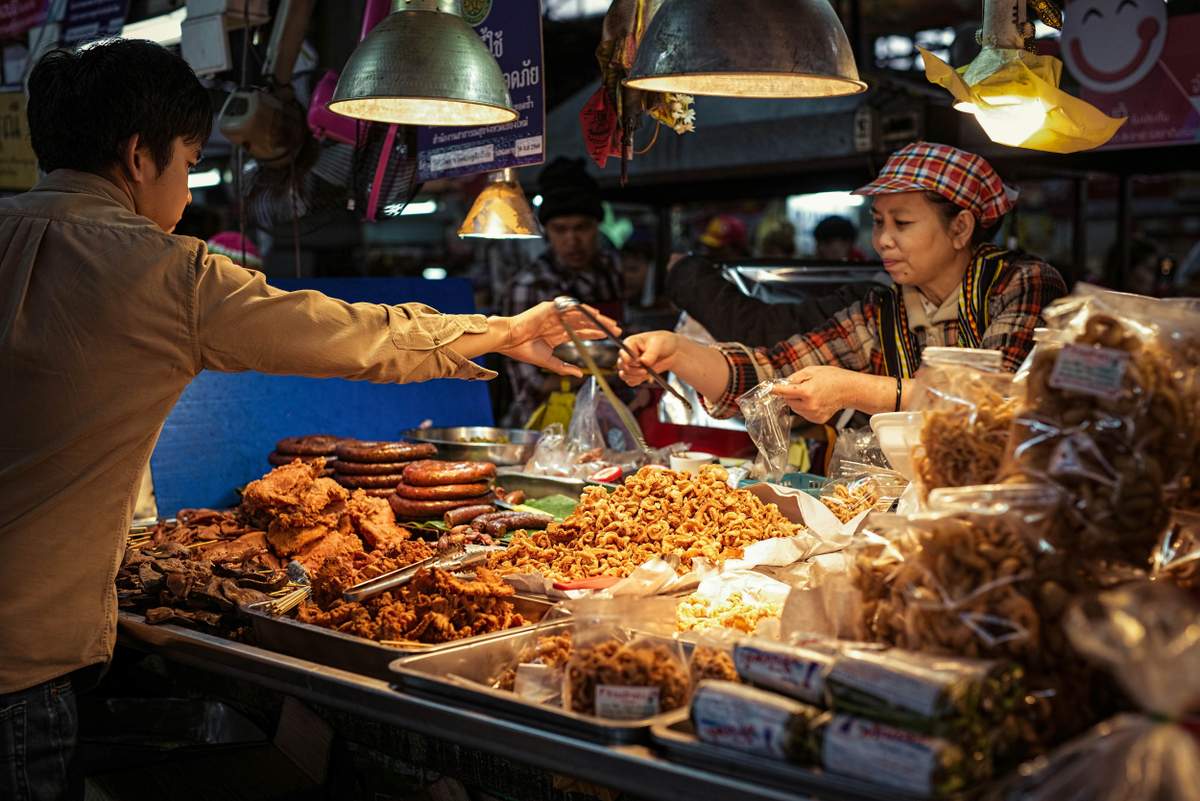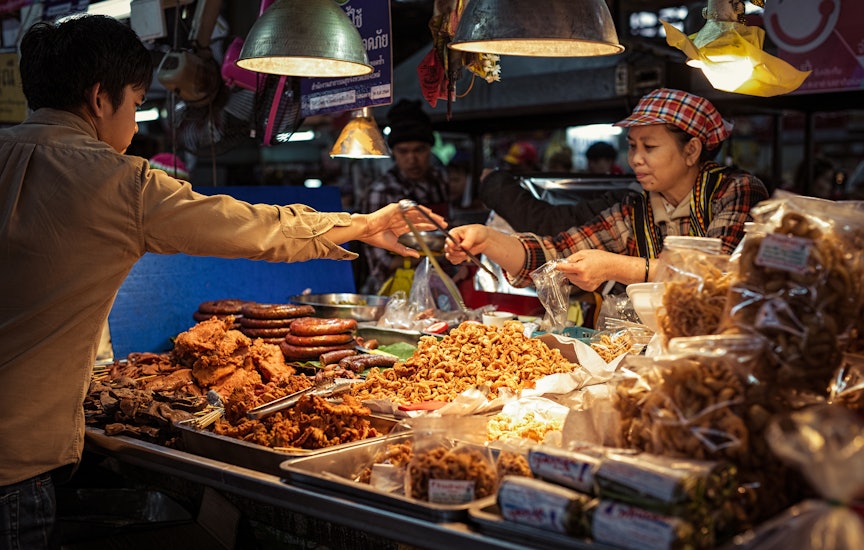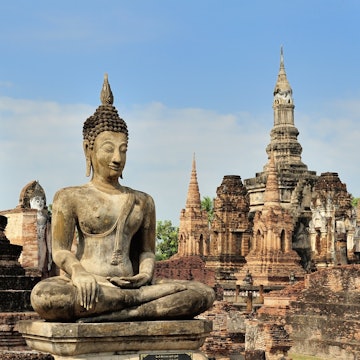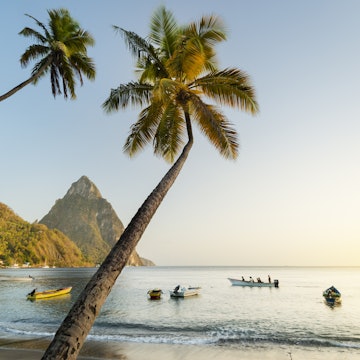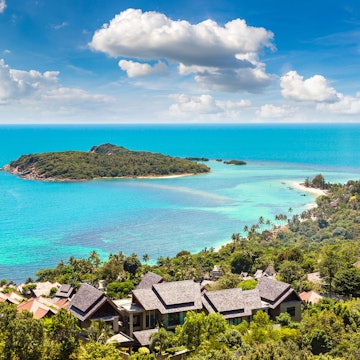

The best, and most exciting, way to explore Bangkok's smaller waterways is by hiring a longtail boat © Mark Eveleigh / Lonely Planet
From the moment your plane starts its descent towards this sprawling city of eight million people, the first thing that’s likely to catch your attention is the glint of tropical sunlight on water: a jade-tinted mosaic of flooded paddy fields, filigreed with the silvery veins of canals. Greater Bangkok is networked with an estimated 320km of waterways – here’s how to explore these ‘water margins’.

Taking to the water
‘An expanse of brown houses of bamboo, of mats, of leaves, of a vegetable-matter style of architecture, sprung out of the brown soil on the banks of the muddy river…’ Joseph Conrad penned these words about Bangkok 130 years ago. Even today, there’s probably no capital city in the world where the dramas of daily life are so fully played out on the waterways. Although many of the backwater communities are under threat from development, you only have to travel a short way into these Bangkokian bayous to find that the stilted houses that Conrad wrote about still balance precariously on their rickety legs.
The Chao Phraya River is still the main artery of Bangkok and – whether you really want to get under the skin of this frantic metropolis or simply to escape for a tranquil couple of hours – there’s no better way than to skip the sois (lanes) and thanons (streets) and head for the klorngs (aka khlongs, or canals). The iconic longtail boats probe into the veins of what was once called ‘the Venice of the Orient’.

West of the river
The stilted communities along Khlong Bangkok Yai and Khlong Mon, on the opposite bank from the Grand Palace, still live out their daily life on the water. As your boat putters between the shadowy houses, it often feels as if the jungle is just waiting to reclaim the city with vegetation rioting, giant monitor lizards basking on the banks and kingfishers and egrets flitting down watery canyons. In the morning it’s still possible to see housewives paddling flat-bottomed skiffs to the neighbourhood grocery store, and in the evening children swim in the shade of the little hardwood pavilions that line the riverbanks. At any time of day you’re sure to see fishermen sitting patiently on the bank, waiting for a bite.
Outside every klorng-side temple you’ll see great swarms of fat catfish jostling, sometimes in such numbers that they seem to be heaped on top of the water in a seething mass. Thai Buddhists believe that feeding the fish will bring them good karma, and it’s almost as if the fish realise that staying within sight of the temples not only guarantees them food but also safe sanctuary from Bangkok’s dedicated army of anglers.

East of the river
Waterlogged Bangkok is said to be sinking at a rate of about 3cm per year. If this is true, the peak of the Golden Mount – Bangkok's dazzling gold hilltop stupa – is presumably about 5m lower than it was when the mount was created sometime in the early 1800s.
Nevertheless, from up here you still have a wonderful view along Khlong Saen Saeb, surely one of the world’s busiest inner-city canals, as it slices almost 20km all the way to Bang Kapi quarter (near the eastern outskirts of the city). The canal was built about two centuries ago as a rapid access route, so that King Rama III could shuttle his troops straight to the frontline in the event of a Cambodian or Vietnamese invasion. But it operates just as effectively in the reverse direction, as a main artery through which needle-like powerboats can mainline an estimated 30,000 commuters a day straight into the city’s heart.

A boat ride along Khlong Saen Saeb might be a great way to avoid the stress and hassle of the city-centre rush hour, but it can be as exciting as any túk-túk (motorised transport) ride you’re ever likely to make. The bridges on this canal are so low that the ticket collectors wear crash helmets and, when the water level is particularly high, the captain pulls a lever so that the collapsible roof descends onto the ducked heads of the passengers inside. It’s a uniquely exciting river journey with these James Bond-esque commuter boats roaring within a few metres of each other and passengers leaping onto the bucking pontoons.
Islands in the stream
Thailand is as famous for its islands as it is for its uniquely exciting capital city, but few people realise that it’s possible to have a taste of both at the same time. Bang Krachao (just 7km south of the city centre) is known to a few urban escapees as ‘Bangkok’s Green Lung’. A green lung might seem like about the unhealthiest prospect imaginable, but this great expanse (almost 20 sq km) of coconut palms, papaya plantations and rice paddies makes an idyllic escape from the city. You can rent bicycles to explore the island's tangle of sleepy rural lanes and raised concrete passageways.

Far across the opposite side of the city (about 40km up the meandering Chao Phraya River) you’ll find the smaller Ko Kret island. From the backpacker quarter around Khao San Road, Ko Kret makes for an easy Bangkok day trip. You can take the Chao Phraya Express commuter boat up to Nonthaburi town (about 40 minutes) and, once there, haggle with the skipper of one of the whippet-like mini-longtails. These undersized (but overpowered) little speedboats can have you skipping, white-knuckled, up the channel into Ko Kret in about 15 minutes.
Once on the island, the pace slows markedly. At weekends the market here can be busy with escapees from the Big Chilli, but the 6km track that circles the island is blissfully devoid of Bangkok’s infamous traffic. These sleepy flooded hinterlands certainly feel like they move at a difference pace to the rest of the Thai capital, but these areas – along with the waterways that lead you here – could end up being your favourite part of the city.






